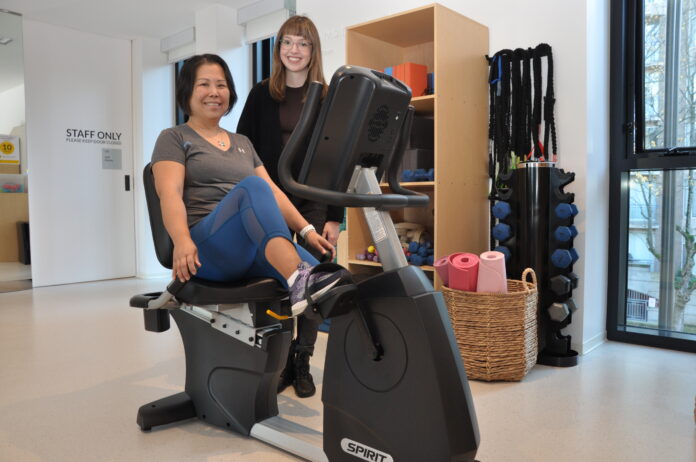

When Kelcey Bland graduated with a Bachelor’s degree in Kinesiology from the University of British Columbia (UBC), she could never have guessed that she would begin research that would take her to Australia and back to study the effect of exercise on cancer.
As a postdoctoral fellow at UBC’s Cancer Exercise and Physiotherapy Lab in the Department of Physical Therapy, she has spent the last 10 years studying exercise in relation to cancer.
After her first degree, she took a job in Kristin Campbell’s lab, with the opportunity to help with an exercise study for women with breast cancer and the effect of exercise during chemotherapy. For Bland’s Ph.D., she worked with Eva Zopf and Prue Cormi in Australia, studying how exercise can support people with more advanced cancer.
“A lot of the research the past two decades has really been on how exercise can help people with earlier stage or more curative disease,” said Bland.
“Now, we’re also realizing that people are living longer even though they might have a more advanced cancer diagnosis or have metastatic cancer … they can still benefit from exercise interventions.”
Right now, Bland is working on knowledge mobilization and translation of exercise guidelines.
“Different cancer types, different stages and looking at how it can help manage cancer treatment side effects, improve their physical fitness and function and just improve their overall quality of life after their diagnosis,” she said.
Exercise can be empowering for cancer patients, said Bland.
“It gives them some control back … it’s like some control over their health that they might have felt like they had lost because of their diagnosis,” she said. “That’s the most powerful thing I’ve observed.”
Through her own research and in other ongoing studies worldwide, researchers have found good evidence showing that exercise can help manage certain cancer treatment side effects, such as fatigue, while also being incredibly beneficial psychologically, said Bland.
“Now what we’re starting to research more is how exercise might actually be able to improve clinical outcomes … if someone who’s active during their chemotherapy can tolerate their treatment better.”
This may even be crucial in helping prevent cancer recurrence, said Bland.
“There have been some studies conducted and there’s a couple of big ones underway,” she said. “So I think we’ll get some more evidence that will hopefully be quite exciting for the field.”
One way to help support those affected is just by talking to them, said Bland. Finding the preferences and abilities of the patients can go a long way. She added that many think exercise must be super hard or intense to be effective, which is not always the case.
“I think educating people about what a realistic starting point is … just starting really slow, really gradually and building up as you feel you can tolerate.”
Ryan Hamilton agrees with this idea, adding that any movement is good movement and we don’t need to follow strict rules and guidelines for exercise.
The psychology professor did all three of his degrees at UNB, including a Masters in sport and exercise science and a Ph.D., which eventually led him to teaching. He entered the cancer research field after doing a research job at a hospital which exposed him to working in cancer survivorship.
“The intention of my studies was really to get into sport and exercise psychology, both in terms of how to enhance performance, but also how to derive the benefits from sport and exercise activity,” he said.
Hamilton has a sport psychology consulting business and has worked at the Olympics, with Hockey Canada, the Tampa Bay Lightning and various tennis and golf professionals. He was surprised at how this work was able to transfer over to his research in exercise in relation to cancer.
“I realized that some of the things that I talked to athletes about was also relevant for people who had cancer … the messages had to be tweaked a little bit, but many of the skills for coping, the skills for being happy and making the most of our opportunities and activities,” he said.
When it comes to exercise, Hamilton is a believer that mood follows action.
“People rarely regret going for a walk or going for a workout, because they usually feel good afterwards.”
The largest caveat in this situation is that this can be incredibly difficult for cancer survivors, said Hamilton.
“[The] narrative is very much cancer is something that you get, you fight and you win,” said Hamilton. “But the reality is, there’s no going back to normal.”
One of Hamilton’s research projects was on the effects of lymphedema on cancer survivors. Lymphedema is a swelling of the limbs that can affect cancer survivors after they have ‘beat’ the disease. This can make returning to exercise difficult, he added, when survivors are not able to participate in activities they once enjoyed. Even items such as jewelry could be a nuisance for those affected by lymphedema.
“People feel like they lose identity, they lose valued activities, they lose things that they enjoy,” said Hamilton. “There’s some extra loss that comes when people develop these secondary conditions when they’re just so ready to go back to their lives as they were.”
Five years ago, Hamilton spearheaded a study on running after cancer, which followed a group of people who had survived cancer who got together twice a week. After running, they would have conversations about mental skills for running and how they could be applied to coping with cancer.
“So teaching the skills for running was sort of a metaphor for teaching these skills for life,” he said.
Most importantly, in a tumultuous period of someone’s life, Hamilton has a clear message: “Something is still better than nothing.”
